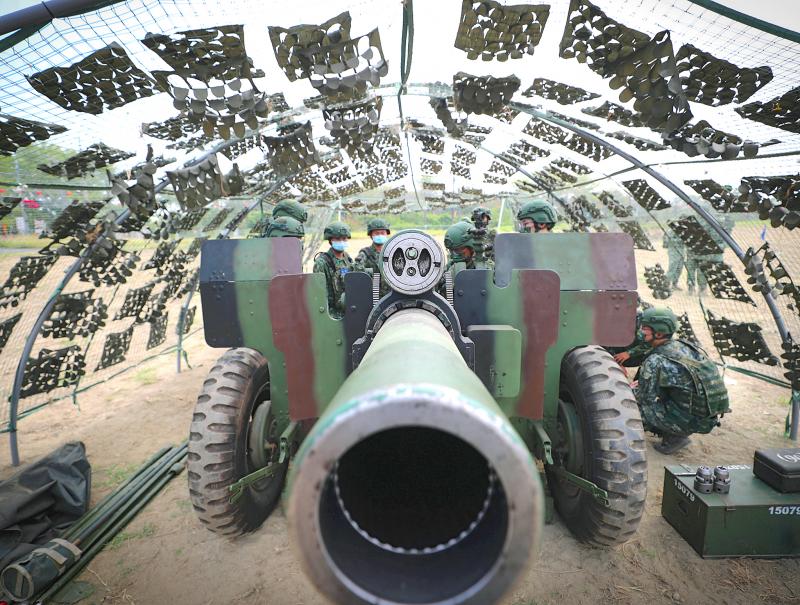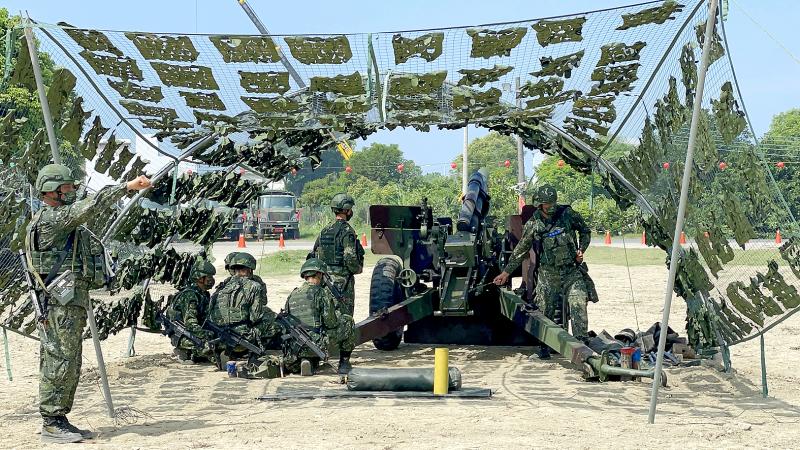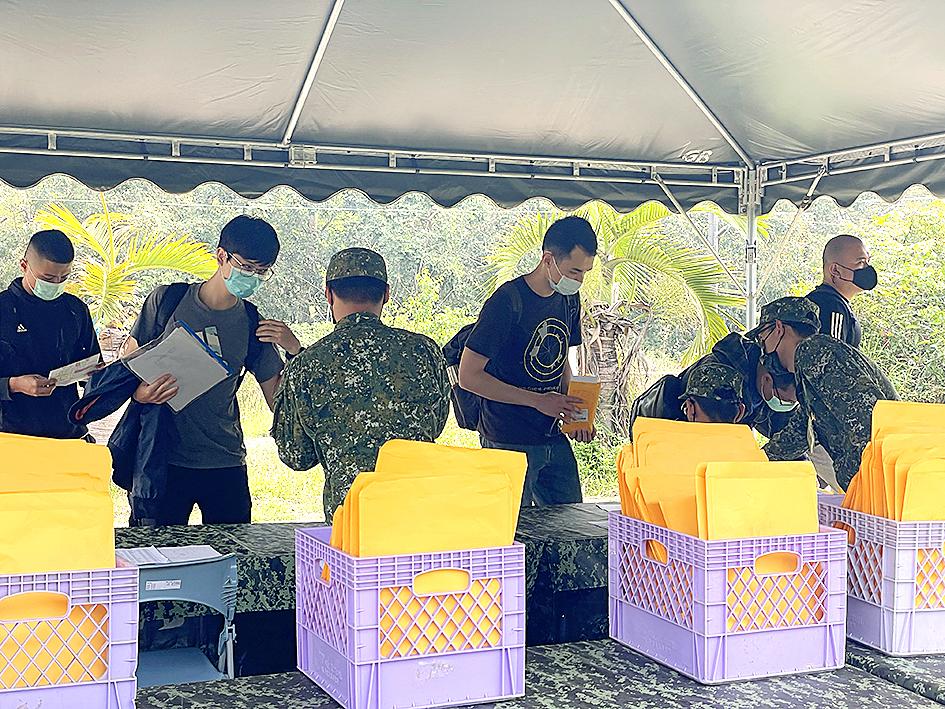In the last couple of weeks Taiwanese have reacted with growing uneasiness to the Russian invasion of Ukraine. A recent poll from the Taiwan Public Opinion Foundation (TPOF) shows that clear majorities think the invasion unjustified and support Taiwan’s participation in the western sanctions on Russia.
A poll by the ruling Democratic Progressive Party (DPP) showed that 65 percent of the populace was willing to fight for the nation. Clearly Ukraine’s experience is reshaping the public’s view of defense. The moment is here to be seized, if the government will move on it.
In “The View of Ukraine from Taiwan: Get Real About Territorial Defense,” retired Taiwan Admiral Lee Hsi-min (李喜明) and Michael Hunzeker argue for a territorial defense force organized along eastern European lines.

Photo courtesy of the 203rd brigade artillery battalion
TERRITORIAL DEFENSE FORCE
They call for “creating a permanent territorial defense force that will operate as a stand-alone service under the aegis of the Ministry of National Defense.” The article focuses on the territorial defense as a paramilitary response, with excellent suggestions for organization.
The idea of a stand-alone service is particularly important. Current arrangements are completely unsatisfactory.

Photo: Wan Yu-yan, Taipei Times
In the eastern European countries, Lee and Hunzeker point out, civil defense efforts are focused on fostering territorial defense capabilities with an eye to denial of political control by building the capabilities to carry on an insurgency.
Unfortunately, they observe, Taiwan has (wrongly) opted for creating a reserve force that mirrors the US model of an operational reserve. What is needed, they contend, is a force oriented on territorial insurgency, on denial of political and social control to the invader, as in Ukraine.
Civil defense is particularly urgent because Taiwan has none of the advantages of eastern Europe with its broad spaces and shared land borders. It cannot trade space for time.

Photo: Wan Yu-yan, Taipei Times
Supplies to Taiwan will have to travel in ships, and that will not happen if China has control of the air over the island sufficient to permit the landing of troops. We cannot assume that the Chinese will be as incompetent as the Russians and let a Taiwan insurgency constantly re-equip itself from captured weapons.
Readers might argue that insurgents can retreat into Taiwan’s rugged mountains when the cities are occupied. The Chechen insurgency eventually did that too. It is now a memory. If a Taiwan insurgency is forced to operate out of the mountainous regions of New Taipei City’s Wulai District (烏來) or Chiayi County’s Alishan, it has probably already lost.
In addition to vast space for retreat and reorganization and the realistic possibility of re-supply, Ukrainian insurgents have another “advantage” — the fighting against the Russian seizure of areas in southern Ukraine has produced a body of experienced instructors to train paramilitary groups.
One Ukrainian trainee observed in a Radio Free Europe report: “we all know what happened in 2014. There was no military recruitment. No one knew what to do. The officers were idiots.”
Many died needlessly, he said, because volunteers lacked training in simple first aid techniques like applying tourniquets.
That is the situation we will face in Taiwan if/when Beijing attacks.
EXPANDED CONSCRIPTION
It is hard to see how expanded conscription will address any of the intractable problems of space and supply, or gift Taiwan with the infrastructure and organization it needs. Worse, while extending conscription is under discussion, upgrading military training and preparation is not. Ex-conscripts laugh at the current conscription program.
An acquaintance did his four months in an anti-tank unit. They were able to shoot six bullets at a time for weapons training, but their anti-tank training did not involve any firing of real weapons at targets. They received one day of first aid training, absolutely minimal. Most of the younger males I know report similar experiences.
The current conscription program is geared at checking boxes on a list, not in providing recruits with realistic training as insurgents. Extending it without massive expenditures to upgrade the experience will be worse than useless.
Extended conscription is just another Taiwanese-style pretend solution adopted because it will minimally inconvenience society, especially businesses. What is necessary is a deeper and more meaningful conscription that offers intense, realistic training that embraces hundreds of thousands of young people from across society.
Supporting a territorial defense force will require prepositioning in Taiwan of thousands of man-portable surface-to-air missile and anti-tank systems (which can be used against landing ships), as well as massive quantities of other weapons and ammunition and ready meals, for realistic training.
Lee and Hunzeker call for the construction of numerous armories at the local level, so that when the paramilitary forces are mustered, they can immediately be supplied with weapons.
We have this tradition in Taiwan. It used to be that on Kinmen and Matsu the locals were permitted to keep guns at home for civil defense. The ammunition was stored elsewhere. During 228, Taiwanese youths trained during the Japanese occupation were able to get weapons from Japanese armories and keep public order. Anyone who has looked at surviving 19th century homes and warehouses in Taiwan has probably noted the guns slits and turrets.
GETTING INTO THE WEEDS
Piles of shiny weapons are important. But civil defense programs in Taiwan should involve the entire society in support. Plenty of gardeners could be called on to teach Taiwanese the fine art of growing victory gardens in Taiwan’s urban jungles. First aid skills should be taught to a broad segment of the population. Programs in learning how to deal with the injured in the rubble of buildings should also be instituted (handy for quakes and typhoons).
In time of war, local implementation of civil defense planning falls on the neighborhood captains under the aegis of the National Policy Agency (NPA). It’s time that the island instituted an annual one-day national holiday to practice civil defense at the local level, and give the police and local officials hands-on experience with carrying out plans, and the public practice with complying.
In Ukraine volunteer programs on weekends taught needed skills. In Taiwan there is a local structure that could easily be adapted for that function: local community colleges, hosted at local schools and activity centers.
President Tsai Ing-wen’s (蔡英文) administration is moving slowly, probably because a number of bureaucracies are involved. The All-out Defense Mobilization Agency (全民防衛動員署) is first the responsibility of the Ministry of Defense, which mobilizes the reserves. The Ministry of the Interior is responsible for civil defense, while the NPA is responsible for implementing the civil defense plan. Police are massively overworked, and the NPA already has its hands full with the COVID response.
There are civil defense programs and training for NPA officials (a massive four hours annually!), but if you copy and paste the Chinese characterse for civil defense “民防” in to YouTube, you will see all sorts of things uploaded to fulfill the requirements of civil defense training, including civil defense officials doing karaoke at a civil defense training session. Judge for yourself how useful and relevant the training is. Much of it, I am told, is aimed at police activities such as combating drug and human trafficking, rather than civil defense.
The public is ready. The government must lead.
Notes from Central Taiwan is a column written by long-term resident Michael Turton, who provides incisive commentary informed by three decades of living in and writing about his adoptive country. The views expressed here are his own.

Taiwanese chip-making giant Taiwan Semiconductor Manufacturing Co (TSMC) plans to invest a whopping US$100 billion in the US, after US President Donald Trump threatened to slap tariffs on overseas-made chips. TSMC is the world’s biggest maker of the critical technology that has become the lifeblood of the global economy. This week’s announcement takes the total amount TSMC has pledged to invest in the US to US$165 billion, which the company says is the “largest single foreign direct investment in US history.” It follows Trump’s accusations that Taiwan stole the US chip industry and his threats to impose tariffs of up to 100 percent

On a hillside overlooking Taichung are the remains of a village that never was. Half-formed houses abandoned by investors are slowly succumbing to the elements. Empty, save for the occasional explorer. Taiwan is full of these places. Factories, malls, hospitals, amusement parks, breweries, housing — all facing an unplanned but inevitable obsolescence. Urbex, short for urban exploration, is the practice of exploring and often photographing abandoned and derelict buildings. Many urban explorers choose not to disclose the locations of the sites, as a way of preserving the structures and preventing vandalism or looting. For artist and professor at NTNU and Taipei

March 10 to March 16 Although it failed to become popular, March of the Black Cats (烏貓進行曲) was the first Taiwanese record to have “pop song” printed on the label. Released in March 1929 under Eagle Records, a subsidiary of the Japanese-owned Columbia Records, the Hoklo (commonly known as Taiwanese) lyrics followed the traditional seven characters per verse of Taiwanese opera, but the instrumentation was Western, performed by Eagle’s in-house orchestra. The singer was entertainer Chiu-chan (秋蟾). In fact, a cover of a Xiamen folk song by Chiu-chan released around the same time, Plum Widow Missing Her Husband (雪梅思君), enjoyed more

Last week Elbridge Colby, US President Donald Trump’s nominee for under secretary of defense for policy, a key advisory position, said in his Senate confirmation hearing that Taiwan defense spending should be 10 percent of GDP “at least something in that ballpark, really focused on their defense.” He added: “So we need to properly incentivize them.” Much commentary focused on the 10 percent figure, and rightly so. Colby is not wrong in one respect — Taiwan does need to spend more. But the steady escalation in the proportion of GDP from 3 percent to 5 percent to 10 percent that advocates